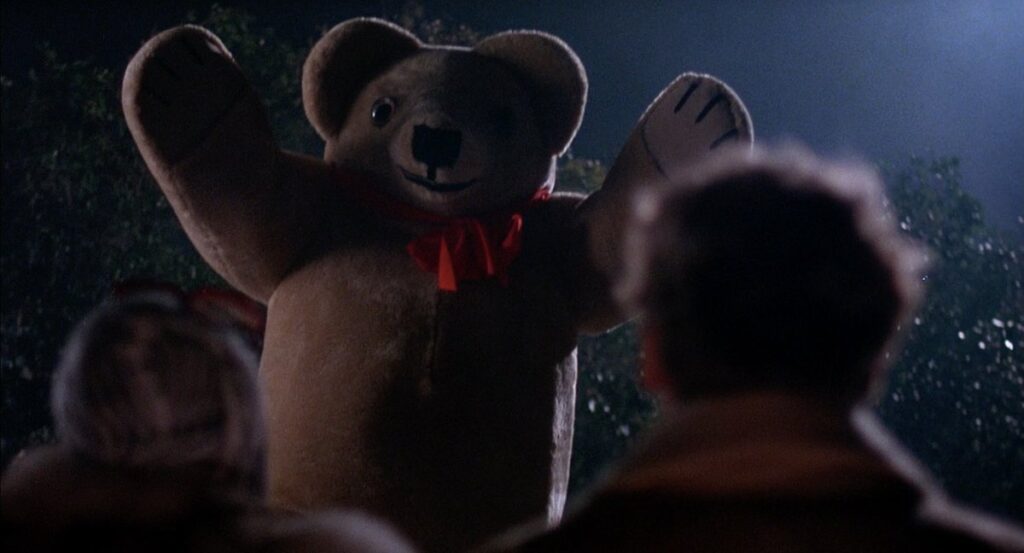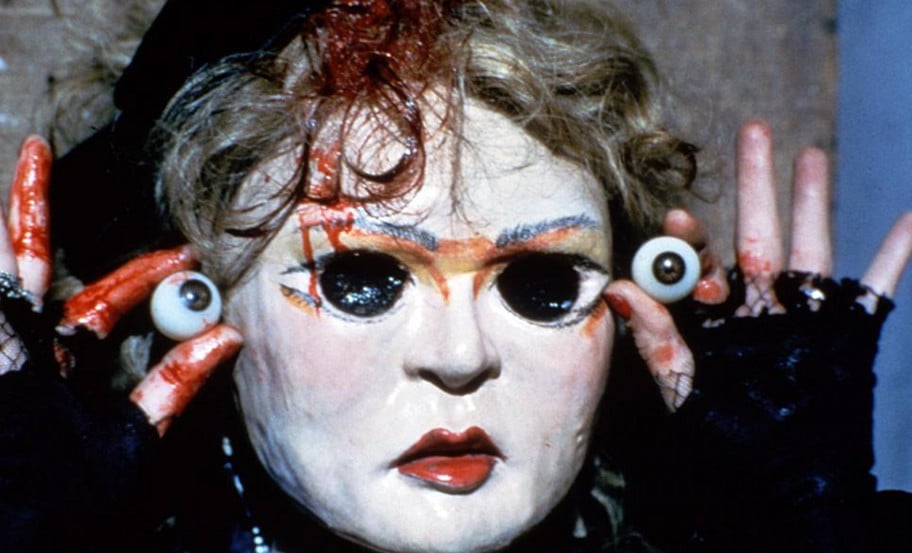‘Dolls’: Grasping At Childhood Wonder in Stuart Gordon’s 1987 Film

Note: This article contains references to domestic violence.
I had so many toys as a kid. With a truck bed-sized wooden trunk full of them, it was like living on the Island of Misfit Toys. I collected Beanie Babies. I staged grand, world-defying battles with Heman action figures passed down to me from my older brother. I became unhealthily obsessed with my Looney Tunes Giga Pet. I had complete The Lion King playsets. I cooked up Creepy Crawlers and self-designed pogs on the daily. On Friday nights while watching Sabrina the Teenage Witch, I made Lite-Brite designs and Play-Doh creations, and dolled-up Barbies in high-fashion fun, and moonwalked on those outrageous bouncy shoes, and even pretended my Tamagotchi was a real space creature from another planet.
But there was a reason for all of that: domestic violence polluted my childhood. I was never directly abused myself. But I frequently found myself caught in the crossfire, witnessing physical and psychological terrors I’ll never soon forget. I turned to the land of make-believe to cope, tucking as far and away from the real world as my imagination would allow. When I watched Dolls for the first time this summer, I not only saw my childhood flash before my eyes; I was reminded of the archaic notion that we, as adults, must pack away all our childhood fantasies.
Venturing into the world of Stuart Gordon’s ‘Dolls’
With Stuart Gordon’s direction, Dolls repurposes a child’s imaginative amusements into an allegory about grasping for the wonder we feel in our youth, a pulsating glow which soon becomes extinguished when adolescent silliness bleeds into worry about adult things like bills and student loans. Carrie Lorraine plays Judy, whose father David (Ian Patrick Williams) has married the villainous Rosemary (Carolyn Purdy Gordon), the archetypical evil stepmother. Her spiteful words and teeth-baring sneers come not from the storybook variety as found in Cinderella. Rather, they come from the pressures of adulthood and implications that even entertaining thoughts of whimsy make you an absolute nutter.
The midnight hour has taken hold, and a thunderstorm ravages the English countryside. The family is on a much-needed holiday. As they weave through the backroads, they soon become stranded when their automobile gets stuck in the mud. They soon set off on foot into the surrounding woods to a gothic-style mansion, whose mangled, deteriorated exterior deceives the viewer upon first glance. A drowned rat, Rosemary loses her temper and tosses Judy’s beloved stuffed animal Teddy into the bushes. She quickly dashes away, leaving the terrified young child to scrounge around the shrubbery for her furry friend.

Judy is a bit taken aback. In her shock, she imagines Teddy reemerging from the shadows as a giant, blood-thirsty beast, quickly disposing of her father and stepmother. It’s all in her head, of course, and demonstrates the sheer power of imagination itself; it can help create the world you want, and destroy the one you don’t.
Related: 8 Stuart Gordon Classics You Can Stream For Free Right Now
I could spend hours wandering through the halls of pretend. Somehow, fancying a collection of Beanie Babies as a mythical coven of life-saving creatures or crafting entire Mario Bros. worlds out of paper dolls gave me a sense of agency. I pictured myself as the hero of my own story; an escapist fantasy that stood in stark contrast to the sometimes brutal violence swirling like knuckled masses of storm clouds over my everyday life. I wore imagination as a cloak, perhaps explaining the high frequency of daydreaming much later in my life.
Now, as I reassess my childhood, I am realizing that I have largely swapped out physical toys for visions. I frequently find myself imagining what my life would, should, or could have looked like, as if I’m trapped in some sort of Choose Your Own Adventure storybook. With each decision, I could slip further from the screaming, and the beating, and the shattering glass until it was nothing more than a dense fog rolling along just outside cobblestone walls.
After trudging through the mud and rain, our protagonists eventually arrive on the mansion’s doorstep. Its eerie facade stands in stark contrast with is a deceptive casing for warmth from its generous, congenial hosts Gabriel (Guy Rolfe) and Hilary Hartwicke (Hilary Mason). Quite an oddball pair, not unlike The Munsters or The Addams Family, simply misunderstood, emblematic figures for the outcasts of society, they gift Judy a new play-friend named Mr. Punch. Gabriel and Hilary’s business is toy-making, and they find great joy in watching a child’s face light up. A vast collection of handmade dolls and other wooden playthings line the halls and innumerable rooms, a treasure trove of delightful invention and originality.
Related: R.I.P Stuart Gordon: Writer/Director of Re-Animator & From Beyond Has Passed Away at 72
An unlikely band of characters 一 Isabel (Bunty Bailey), Enid (Cassie Stuart), and Ralph (Stephen Lee) 一 arrive soon after, having also found themselves stranded on the side of the road. Isabel and Enid are quintessentially ‘80s glam-rockers, touting a rebel attitude and a flair for the dramatic, seemingly caught between childhood and adulthood. They’ve lost all sense of child-like wonder and find dolls to be a tad silly. Yet with adulthood closing in on them, their gleeful irreverence for authority effectively makes them the outsiders.

Conversely, Ralph clings to his veneration for toys beneath a shroud of shame, as if it somehow makes him less than worthy of compassion. When Gabriel asks him about his fascination with their immense toy collection, Ralph simply shrugs it off. He explains that his father instilled within him a love for such things. “He used to tell us stories about how toys woke up after we went to sleep, and they’d start to wander all over the house. So, I stayed up night after night to see if I could catch my toys playing on their own,” he reveals. He also notes his father died when he was nine 一 and perhaps his childhood with it.
“I can remember every single toy I had when I was little,” he adds. Gabriel responds, “Toys are very loyal, and that is a fact.” This brief exchange cuts to the heart of the matter. Toys and playing pretend are crucial to the blossoming of one’s mind and spirit. Without the freedom to conjure and create and think all manner of magic things, well, one can only feel unfilled and lost in life.
Related: WATCH: 10-Minute Documentary on Stuart Gordon’s CASTLE FREAK With Barbara Crampton & Jeffrey Combs
As the night wears on, and everyone settles into their rooms for a welcome slumber, the dolls come out to play 一 and to murder. Their bloodlust is not unwarranted, however. It often stems from the guests’ disrespect for the elderly couple’s property or a blatant dismissal of childhood and imagination. The gruesome setpieces, from plucking out Isabel’s eyes to slaughtering Rosemary in her bed, are symbolic of the tug-of-war that rages inside all of us. Once we hit adulthood, we’re taught to suppress our inner child; so much so that we threaten to lose any sense of individuality. As we discover with Ralph, a poor soul conditioned to believe he must outgrow his love of toys, there always comes a time when you learn you can have the best of both worlds. Adulthood should not come at the expense of childhood.
Of course, sometimes it can’t be helped. You suffer trauma, forcing you to grow up much faster than you should. It takes you even longer to heal and recover before you realize that the world’s ugliness doesn’t have to ruin you. As I was coming of age at the turn of the millennium, and I struggled to understand my identity and what society expected of me, my home life crumbled down around me. It’s sometimes hard to aptly describe what it was like, emotionally and psychologically, to be that kid whose parents’ violent, thorny words rang like a cathedral bell throughout the entire neighborhood.
Related: After Filming BRAHMS: THE BOY II, Katie Holmes Developed a Fear of Dolls
One particular moment is seared into my memory. I stood frozen amidst a game of basketball, as my father’s and stepmother’s throaty screams seemed to float like dandelion seeds on the sweltering mid-summer heat. I could only choke down the embarrassment and fear, knowing I’d have to go home for dinner soon. I’d hang my head in shame, slink down the street through the evening’s fading light. I’d tip-toe up the front steps, and dash to my room as quickly and as quietly as I possibly could. My imagination, my one true safe haven, awaited.
Decades later, such moments seem like a dream. I can’t tell if they’re real or if I simply made them up. Either way, indelible scars leave faint traces on my skin. I’ve somehow managed to manifest a wonder for the world again in most facets of my life, even on the dark, depressive days. Whether I’m losing myself in the 100th viewing of Hocus Pocus or cleaning up my stuffed Humpty Dumpty doll, I may not even be here without that willingness to dream and ride that magical carpet ride that is imagination.
Gordon’s Dolls reels you into a traditional possessed-doll fable, one packed with classic scares, incredibly effective stop-motion animation, and grisly gore, and you stay for the powerful tale about one young girl and one older man’s battle against themselves and the pressures of society. With its wonderfully campy tone, the film imparts to the viewer that there is simply no reason we must leave our childhoods behind. In fact, it would be downright silly to do so. We need more amusement in the world.
Categorized:Editorials News

